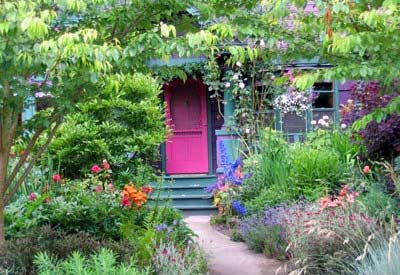Our far-flung correspondent in often arid Santa Fe leaves town and reports back:
I spent a few days at the end of last week in Tacoma on family business and would like to report it rained on Friday. Nothing unusual about that, this is after all the wet northwest. But it was unusual for this summer. In fact, as the newspapers reported, it was the first time it had rained in 35 days.
Now, sunny summers aren’t that unusual around Puget Sound. But the duration of this dry spell was and it had an effect on the usually lush landscaping that surrounds even the most modest homes. The talk? It was about rain.
No, this isn’t some attempt to work in the subject of climate change, though there’s no doubt that things are a bit different here than they used to be. Larger factors, like the El Nino phenomenon, may mean that some years will actually be wetter. All this can be very interesting and fascinating to watch over a period of years but the practical is what interests gardeners who know that you work with what you get. And what gardeners got this year was no rain the entire month of July.
So it wasn’t surprising that coffee shop talk was about the rain. There was some discussion how yards had turned brown — gone dormant as yards do the last warm, dry weeks of summer — and questions about whether or not they would green up after the rain. By Sunday, it looked like they had.
But what struck us most was the fact that every yard we saw, even those around the most modest homes, reflected some kind of gardening. It seemed silly and obvious, of course, but we realized something we already knew: people love to garden. They love plants. They love flowers and vegetables and outdoor spaces and they often work hard to fashion them in designs and plantings of their own choosing. They wind walkways through their gardens that may travel only a few yards but offer something unique at every turn. Some yards were dominated by trees that dictated what could be grown beneath them. But many were open and layered, mimicking the layers of the forests that were once here: trees, and understory, understory and ground covers.
The variety here — we walked for miles through the middle class neighborhoods — was amazing in this moisture abundant area. Annuals and perennials, flowers and vegetables. Pots and walks and raised beds and cold frames, the occasional entire yard planted in vegetables. Flat yards and terraced yards. Beautiful, rust-colored Japanese maples and dwarf fruit trees of all types. Trumpet vines cascading over fences. Bonsais and trees sculpted in extreme acts of topiary. Azaleas and rhododendrons, pansies and petunias, daisies and zinnias, herbs used as borders and ground covers, squash and beans twining through lush undergrowth to find their place in the sun. One gentleman had planted his entire front yard with dahlias and then set out even more in pots; so many that they formed a sort of wall, the overwhelming colors rivaling even the most electricity-hungry Christmas display. In two different yards we saw something common in New Mexico where we live: rain barrels!
This is the rainy, monsoon season in New Mexico — four inches in July! — and people make the most of it. We, too, have trumpet vines and plants now in flower and the ground is covered with greenery that waits all year until mid-summer and to spring forth. Small vegetable plots, sparingly watered, are producing big yields. Under any conditions, people love their landscapes, they love to garden. It’s universal. And I think all of us, even those who don’t or can’t garden but enjoy seeing — and smelling! — the fruits of every gardener’s labors are better for it. The world is better for it. Gardening, next to caring for friends and family, may just be the most rewarding thing we do.












